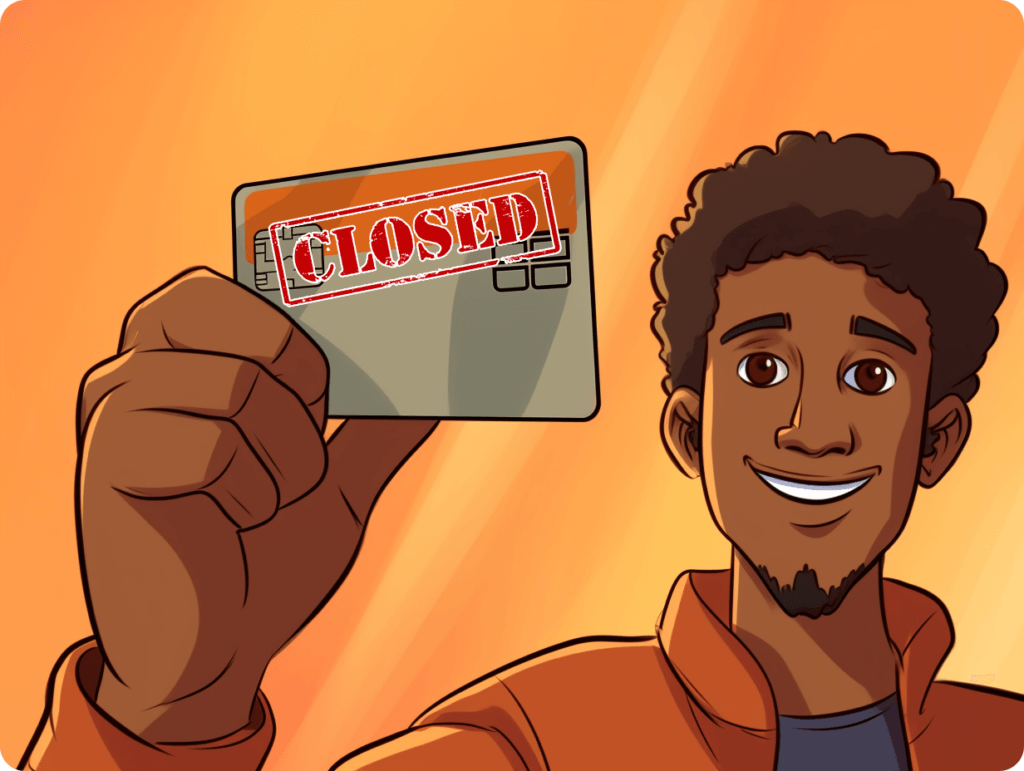- Blogs
- /
- What Does Account Charge-Off Mean and How to Resolve It
What Does Account Charge-Off Mean and How to Resolve It

Summary
Imagine looking at your credit report and seeing the word “charge off.” It’s sure to make you concerned about your finances.
This word raises doubts and uncertainties about its effect on your financial well-being. Even so, there’s no need to worry.
What does account charged off mean? Learning the true meaning of ‘Account charge off’ is like learning the code of credit and debt.
This scary-sounding word is not the end of the world for your finances. Come along as we explore the ins and outs of this mysterious word. We’ll define it and discuss its ramifications.
Above all, we’ll identify concrete actions you may take. If you encounter an account marked as “charged off.”
Key Takeaways
- A charge-off occurs when a creditor writes off a debt as uncollectible. This impacts your credit report. It’s often linked to missed payments or delinquency, reflecting financial irresponsibility.
- The amount remains owed even after the charge-off.
- Fixing a charge-off requires structured repayment plans and financial negotiation skills.
- Charge-offs can remain on your credit report for up to seven years. This can hamper creditworthiness. It lowers credit scores and hinders obtaining new credit, making credit rebuilding challenging.
- Charge-offs severely impact credit scores. Multiple charge-offs worsen credit history and recovery prospects.
- Taking swift action on charge-offs demonstrates responsibility. Addressing it promptly safeguards financial stability and future borrowing capabilities and minimizes financial repercussions.
- Seeking professional guidance aids in navigating complex charge-off-related challenges effectively.
Charge-Off Basics

Credit Consequences
A charge-off happens when a creditor writes off a debt as uncollectible. This means the creditor doesn’t expect payment for the outstanding balance. This can impact your credit score.
Charge-offs are linked to missed payments or delinquency on an account. This indicates financial irresponsibility.
When charged off, your creditor could hand over or sell your account to a collection agency. This transfer can lead to persistent attempts by the collection agency to recover the amount owed from you. Charge-offs have long-lasting effects. They can remain on your credit report for up to seven years.
Many charge-offs worsen the situation. They make it harder for individuals to rebuild their credit history. Promptly addressing charge-offs is crucial. It minimizes their negative impact on one’s financial standing.
Recovery Journey
Charge-offs have severe and far-reaching consequences. They significantly lower your credit score and make obtaining new credit challenging. With each charge-off, rebuilding one’s credit becomes increasingly tricky.
It’s essential to act quickly after discovering any charged-off accounts. This will help reduce their negative impact on your financial health. Paying off a charged-off account won’t immediately remove it from your credit report. Yet, it demonstrates responsibility and commitment toward improving one’s financial standing.
You might get valuable guidance by seeking help from professionals. They can help individuals navigate the complex web of issues stemming from charge-offs. They can also chart effective strategies for managing these challenges.
Importance of Timely Action
Addressing charge-offs without delay is critical. It safeguards financial stability and future borrowing capabilities. By resolving these issues promptly, individuals can prevent further damage. They can also lay the foundations for potential recovery.
What is a Charge Off?
A charge-off means a creditor no longer expects to collect an unpaid debt. To recover from charge-offs, you need proactive steps and financial discipline.
When an account is charged off, the amount of the debt remains owed. The creditor has only written it off their books as uncollectible. Understanding this is vital for navigating the credit landscape and taking appropriate actions.
Charge-offs have long-term consequences on personal finances. Recovering from them requires careful planning and effort.
Credit Impact
The impact of a charge-off on your credit history cannot be overstated. It represents a significant adverse event in your credit history. It can profoundly affect future borrowing opportunities.
Creditors typically record charge-offs after several months of non-payment or delinquency. Many charge-offs on your credit report can significantly lower your credit score.
Understanding what a charge-off entails is crucial. It’ll help you make informed decisions about managing debts.
Lender Actions
Charge-offs severely affect one’s ability to secure new lines of credit or loans. They show that you have failed to repay debts in the past.
Lenders view individuals with histories of charge-offs as high-risk borrowers. They believe these individuals were unable or unwilling to fulfill previous financial obligations. This is a major red flag to them.
A charge-off effect can be damaging. However, the impact lessens with time if you establish positive credit habits.
Understanding the Terms Associated With Charge-off
Write-off vs Charge-off
A write-off is an accounting procedure. A creditor recognizes the debt as unlikely to be repaid and removes it from its active accounts. A write-off doesn’t signify that the debtor no longer owes the money. It remains a debt that creditors can pursue or sell to collection agencies.
The write-off status negatively impacts the debtor’s credit report and credit score. This mark can linger on the credit report for up to seven years, influencing the individual’s ability to secure new lines of credit or loans.
In summary, a charge-off is a type of write-off that applies only to uncollectible debts. The broader term “write-off” encompasses various scenarios. It goes beyond just debt-related issues in accounting and finance.
Transfers
Sometimes, charged-off debts are transferred or sold to collection agencies. They can also be sold to debt buyers. These entities purchase the debt for a fraction of its original value. Then, they attempt to collect the full amount from the debtor.
The transfer of charged-off debts to collection agencies leads to persistent attempts to recover the owed amount. This often involves frequent contact, notices, and potential legal actions to recoup the debt.
Understanding write-offs and transfers is crucial for people dealing with charged-off accounts. These processes mark a significant stage in the creditor’s accounting. However, they do not erase the debtor’s responsibility to address the outstanding debt.
Navigating these procedures requires awareness, caution, and often professional help. This is because of the legal and financial implications.
Debt Discharge
Debt discharge occurs when the court legally eliminates or forgives eligible debts. Discharged debts, including charged-off accounts, are no longer legally enforceable. Creditors cannot pursue collection efforts. Those who have their debts discharged through bankruptcy no longer owe those debts.
However, not all debts can be discharged in bankruptcy. It’s crucial to understand which debts can be eliminated through the process. Certain types of debt, such as child support payments, student loans (in most cases), and recent tax debt, generally cannot be discharged in bankruptcy.
Obtaining a debt discharge can give individuals a fresh financial start. It also creates an opportunity to rebuild their credit. But they must stay informed about any changes in laws or regulations about bankruptcies. They should know how these changes could affect their situation.
How Charge-Offs Affect Your Credit Score

Credit scores are calculated using various factors. These include payment history, amounts owed, length of credit history, new credit, and types of credit used. Charge-offs significantly impact the payment history part of your credit score.
Understanding how credit scores are calculated empowers you to focus on specific actions. These actions significantly impact rebuilding and maintaining a healthy financial standing.
It’s important to understand that reducing overall debt and making timely payments can positively influence your credit score. You should focus on all aspects of your credit profile, not just charge-offs. This will help you effectively improve your score.
Long-Term Effects
It’s important to know that charge-offs can significantly impact your credit report. These negative marks can linger for up to seven years from the date of the first missed payment. They can affect your ability to secure new lines of credit or loans.
However, as time passes and you prove positive financial behavior, the impact of these charge-offs diminishes. Despite this, potential lenders may still consider them even after they’ve been removed from your credit report.
Rebuilding your credit is crucial in mitigating the long-term effects of charge-offs. You can improve your overall creditworthiness by establishing responsible financial habits. Consistently making on-time payments helps.
It’s essential to remain patient and persistent. Overcoming the consequences of charge-offs requires sustained effort.
Regularly reviewing your credit report allows you to understand your financial history. This practice enables you to identify areas needing attention or improvement. It empowers you to take proactive steps to manage your finances better.
Differentiating Between Charge-Offs and Collections
It is vital to understand how charged-off accounts are handled. This knowledge is crucial to navigating their implications on financial well-being.
When an account is marked as “charged off” or “written off,” the creditor has given up on collecting the debt. The creditor deems it uncollectible. This status reflects negatively on your credit report. It signals significant delinquency in repayment.
In addition to charge-off statuses, other account designations include “current,” “late,” “in collections,” or “settled.” Each status provides distinct insights into an individual’s financial standing at a specific time.
Awareness of these various account statuses offers valuable insight into one’s financial history. It presents a detailed snapshot of past actions. These actions are related to borrowing and repaying funds. By understanding these titles, people can make informed choices about their money. They can also plan for future improvements.
Handling Collections
Your account may be sold to a collection agency if charged off. These agencies might contact you to collect the debt.
You have rights under the Fair Debt Collection Practices Act (FDCPA). These rights govern dealings with collection agencies. These agencies must adhere to these guidelines. For example, they should not use abusive language or make false statements.
Communicating with collection agencies in writing is advisable. This allows you to keep records of all correspondence, which can be evidence. Consider consulting with a financial advisor or credit counselor. Do this when negotiating a settlement or repayment plan. This will ensure it aligns with your financial situation.
Be cautious of potential scams or fraudulent collection attempts. Before proceeding, request written debt validation. This will verify the legitimacy of any collection agency contacting you.
Resolving Charged-Off Debt
Individuals with charged-off accounts must take proactive steps toward resolving their debts. One of the first things to do is communicate with the lender. Understand their specific course of action following the charge-off.
Be cooperative and engage in open communication. By doing so, borrowers can lessen further negative consequences.
Negotiating repayment plans or settlements is another viable option for borrowers. Some lenders might be willing to work with individuals. They could offer flexible repayment options that align with your financial capabilities.
Being aware of these steps empowers individuals in handling charged-off debts effectively. It also allows them to make informed decisions about resolving their financial obligations.
Lenders may choose various courses of action when dealing with a charged-off account. Understanding these actions can help individuals navigate through this challenging situation more effectively.
Negotiating Options
You must assess your financial situation when negotiating options for a charged-off debt. Determine how much you can afford to pay towards the outstanding balance. This sets a clear direction for initiating negotiations with creditors or collection agencies.
You can contact creditors or collection agencies directly to discuss potential repayment options. You can also negotiate workable plans tailored to your financial circumstances.
After reaching an agreement, make regular payments according to the agreed-upon terms. Keep detailed records of all communications related to the charged-off account. Keep records of payment receipts too. This ensures clarity. It also serves as documentation for future reference if needed.
Regularly review progress on repayment. This will help assess whether adjustments are necessary in your repayment strategy.
Negotiating with Creditors
Communication Strategies
Communicating effectively with your creditor or collection agency is crucial. Depending on your financial situation, you can negotiate a settlement. This means agreeing to pay a reduced amount as a final payment to clear the debt.
Insist on getting any settlement offer in writing before making any payments. It’s essential. If you ask for a settlement, be ready to prove your financial struggles.
Paying off a charged-off account can improve your credit standing. It can also help resolve the debt hanging over you. You can prove your commitment to resolving the issue by openly communicating. You can then work together with the lender to find a viable solution.
When negotiating with creditors or collection agencies about charged-off accounts, it’s essential to maintain transparency about your financial circumstances. Explain any hardships that led to the charge-off. This will help them understand your situation better. It may lead them to consider more favorable options for settling the debt.
It’s crucial to keep detailed records of all negotiation conversations. This is especially important when dealing with charged-off debts. Be sure to note down dates, names of individuals spoken with, and specifics discussed during each interaction. These records can serve as valuable references. They can help if there are discrepancies in future communications or agreements.
Being proactive and reaching out for discussions shows determination. It also demonstrates your commitment to addressing the issue at hand. Your willingness to engage in these discussions demonstrates responsibility. It may lead creditors or collection agencies toward more flexible solutions.
However, if you find negotiating debt daunting or uncomfortable, seek professional help. Seeking out these experts specializing in debt negotiation could be beneficial.
Settlement Tips
Maintaining open lines of communication is vital throughout the negotiation process. This is especially true when settling charged-off debts with creditors or collection agencies. Honesty about how specific difficulties led to the issue shows sincerity. It also demonstrates a commitment to finding a solution.
Explaining personal hardships can help creditors understand why your account was charged off. Being honest encourages them to offer more flexible payment terms.
Recording all interactions during negotiations is crucial. This includes dates, names, and specific details. It’s essential for managing dealings with resolving charged-off accounts. This meticulous documentation is invaluable for resolving future correspondence or agreement disputes.
By initiating discussions about repayment or settlement, you sincerely intend to address current concerns. This proactiveness portrays accountability, which could sway creditors’ dispositions toward accommodating resolutions.
Navigating settlement alone can feel overwhelming. Enlisting guidance from adept professionals specializing in mediating debts could prove helpful.
Disputing a Charge-Off

Validation of Debts
Requesting the validation of charged-off debts from a creditor is critical. This is important in addressing an unpaid charge situation. The validation process ensures that the debt is accurate and legally enforceable. That it follows established regulations.
If there are uncertainties on specific details related to an unpaid charge-off account, requesting validation clarifies and verifies its legitimacy.
Validating debts is a protective measure. It guards against scams or fraudulent collection related to unpaid charges. You avoid unauthorized or erroneous claims by seeking validation of charged-off debts. Creditors or collection agencies can make mistakes.
Familiarize yourself with your rights under the legislation. An example is the Fair Debt Collection Practices Act (FDCPA). This empowers you with knowledge about protections available when dealing with charged-off debts.
Dispute Process
When you discover errors or inaccuracies in a charged-off account, take action. Start by initiating a dispute with the credit bureaus to rectify these issues. You can file disputes online, by mail, or through credit bureau dispute portals.
To substantiate your dispute claims, provide supporting documentation. This may include payment records or correspondence with the lender. This evidence strengthens your case and increases the likelihood of a successful outcome.
The credit bureaus typically have 30 days to investigate and respond to your dispute. During this time, it’s crucial to check your credit report regularly. Ensure that any inaccuracies have been corrected.
If the credit bureaus find errors or inaccuracies in the charged-off account during their investigation, they must correct them, removing the charged-off account from your credit report.
Disputing inaccurate information is essential to maintaining an accurate and fair credit history. By being proactive and thoroughly addressing discrepancies, you protect yourself from potential negative impacts on financial endeavors.
Understanding Your Rights
Understanding your rights under laws like the Fair Debt Collection Practices Act (FDCPA). It protects you when dealing with charged-off debts. Debtors have specific rights under FDCPA.
These rights are designed to prevent abusive practices by debt collectors. The rights are designed to help debt collectors pursue outstanding balances without abuse. These include protection against harassment, false representations, unfair practices, and unauthorized disclosures.
Individuals can confidently navigate disputes over unpaid charges while upholding their entitlements. They can do this by being aware of these rights. They should exercise them appropriately within legal boundaries.
Removing Charge-Offs from Credit Reports
Start by offering a reasonable settlement amount based on what you can afford. Be prepared for potential counteroffers from the creditor or collection agency. These counteroffers could involve adjusted payment amounts, revised timelines, or alternative arrangements.
Request a written agreement outlining the settlement terms before making any payments. This is crucial. Seek professional advice or assistance when negotiating settlements. This is especially important if you’re unsure about the process.
Professional advisors can offer support in evaluating offers and understanding legal implications. They also ensure that your rights are protected throughout the negotiation phase.
Ensure you have funds available to fulfill the settlement agreement once it’s reached.
Negotiating a settlement for an unpaid charge requires careful consideration and strategic planning. By offering an amount that aligns with your financial situation, you are willing to resolve the issue responsibly. This approach increases the likelihood of reaching an agreement.
Rebuilding Your Credit After a Charge-Off
Establishing Positive Credit Habits
Paying off charged-off accounts is a crucial step in improving your credit score. By settling these accounts, you show responsible financial behavior. You also reduce the negative impact of the charge-off on your credit report.
Establishing positive credit habits plays a significant role in credit repair. Making timely payments and keeping balances low are fundamental to rebuilding your credit.
Timely payments contribute to building a solid credit profile over time. Meanwhile, keeping credit card balances low improves your overall credit health. High utilization rates can negatively affect your score. So, it’s essential to avoid maxing out available credit lines.
Consider applying for a secured credit card. This can also be an effective tool for building or rebuilding your credit history. With this type of card, you provide a security deposit as collateral. This reduces the risk for the lender.
Another option is to become an authorized user on someone else’s account. This allows you to enjoy their positive payment history and utilization rate.
Opening many new accounts quickly can affect your credit score. Exercise caution when considering new lines of credit after resolving a charge-off.
Regular Monitoring
Regularly monitoring your credit report is a fundamental practice. It’s crucial for anyone striving for financial stability and growth. It allows individuals to track their progress. They can also catch any discrepancies early on before they become bigger problems.
Regularly checking your credit reports from all three major credit bureaus is crucial. This helps you track your progress. It also enables you to monitor changes in your credit score and celebrate milestones.
Continuously monitoring progress involves reviewing updated versions of your credit reports. It also means maintaining sound financial management practices. This includes budgeting, saving, and living within one’s means.
Keeping records of payments made towards charged-off accounts allows you to track your repayment efforts effectively.
Use credit monitoring services or apps. Some give alerts for any significant changes or updates on your credit report. These tools can help you stay informed about your charged-off accounts. They can also help you stay informed about developments related to other debts.
Legal and Credit Ramifications of a Charge-Off
Creditors or collection agencies may pursue legal action to recover charged-off debts. They may do so if the debts remain unresolved for an extended period. You should promptly respond if you receive a summons or legal notice about the debt.
Consulting with an attorney specializing in consumer law can provide valuable insights and guidance. This is especially helpful if you face legal action related to charged-off accounts. Understanding your rights and obligations can help you navigate legal proceedings effectively. It can also protect you from adverse consequences.
Ignoring legal notices can lead to default judgments. It can also result in wage garnishment or other unfavorable outcomes. These results could impact your financial stability.
Tips for Avoiding Charge-Offs

Financial Planning
When an account is charged off, the creditor declares the debt unlikely to be collected. The charged-off account will be listed as a liability on your balance sheet until resolved. Accurate financial statements are crucial. They help you assess your financial health and make informed decisions.
Regularly update your financial statements to reflect changes in your liabilities. This is essential. By doing so, you can accurately represent your current financial standing.
Seek professional help, such as a certified public accountant (CPA). It can ensure the accuracy and integrity of your financial statements. A CPA can provide valuable insights into managing liabilities. They can also help maintain healthy financial records.
Incorporating sound financial planning practices is vital. It helps mitigate the impact of charge-offs on personal finances. Developing a comprehensive plan allows individuals to recover from charge-offs. It also helps them work towards achieving long-term financial stability.
Early Intervention
The first step in avoiding charge-offs is to assess one’s financial situation. This also applies to recovering from them effectively. Setting realistic goals based on this assessment can help you create a budget that matches your income and expenses. You can also focus on debt repayment.
Establishing an emergency fund plays a pivotal role in handling unexpected expenses. It prevents future charge-offs due to unforeseen circumstances.
Working with a professional, such as a financial planner or advisor, can provide tailored guidance for individual needs and goals. They can help when developing effective strategies for avoiding charge-offs. They can also help with dealing with existing ones efficiently.
Review your financial plan regularly. Adjust it when needed to keep it relevant. This way, it stays useful amidst changing circumstances or opportunities.
Tax Implications of Charged-Off Debt
1. Cancellation of Debt Income
When creditors charge off a debt, they remove it from their active balance sheet. They no longer expect to be repaid. This action is usually taken when the account has been delinquent for an extended period. Typically, this means six months or more.
Accounts charged off can have significant financial implications, including potential tax consequences. Addressing potential delinquencies or missed payments early is crucial. It’ll prevent accounts from being charged off.
If you have money problems, contact your creditor. Discuss solutions or payment plans with them. It can help. You can also get valuable support by seeking help from credit counseling agencies. Consider reaching out to nonprofit organizations that specialize in debt management.
Early intervention demonstrates proactive financial management and may help mitigate the negative consequences of charge-offs. By acting promptly, individuals can access more options to resolve outstanding debts. They can do this before the debts escalate further.
For instance, negotiating a payment plan with the creditor could prevent the account from being charged off. It also helps maintain a positive credit standing.
2. IRS Guidelines
The Internal Revenue Service (IRS) considers charged-off debts as cancellation of debt (COD) income for tax purposes. COD income is generally viewed as taxable. Specific exclusions or exceptions can apply under IRS guidelines.
The Internal Revenue Service (IRS) provides guidelines and regulations on the taxation of cancellation of debt income. It’s crucial to familiarize yourself with IRS Publication 4681. It offers detailed information on canceled debts and related tax consequences.
Consulting with a tax professional is essential. Determine if you meet the criteria for any available exclusions or exceptions.
You should report COD income correctly on your tax return. It helps you avoid potential penalties or audits by taxation authorities. Understanding the tax implications of charged-off debts enables individuals to plan accordingly. This helps cut any unexpected financial burdens come tax season.
Some people who were broke when their debt was canceled might qualify for an exclusion under certain conditions. This is according to IRS guidelines on COD income resulting from charged-off debts. However, navigating these complex rules requires expert advice. This is due to varying factors, such as assets and liabilities at the time of cancellation.
Bankruptcy Considerations with Charged-off Debts
Bankruptcy can be complex, especially when dealing with charged-off debts. Understanding bankruptcy types is critical when managing overwhelming debt, including charged-off accounts.
Chapter 7 bankruptcy involves liquidating assets to repay creditors. It also helps give you a fresh financial start. Meanwhile, Chapter 13 bankruptcy lets you keep your assets. You can create a repayment plan over three to five years in Chapter 13 bankruptcy.
However, you must understand that filing for bankruptcy has long-term consequences. Consider it a last resort after exploring other options.
Debt Discharge Process
Including charged-off accounts, understanding the debt discharge process becomes vital. This process often involves negotiations between creditors and debtors. They negotiate the amount owed on an account.
Debts discharged through bankruptcy may have different implications. It depends on whether they were for personal expenses or business activities. For example:
- You may be forgiven the outstanding balance if you discharge personal credit card debt through Chapter 7 bankruptcy.
- Business-related debts might not be entirely forgiven under certain circumstances.
Individuals facing such situations must consult legal professionals specializing in bankruptcies before proceeding.
Consulting a Bankruptcy Attorney
Consulting with a knowledgeable bankruptcy attorney is crucial when dealing with charged-off accounts. It’s also crucial when considering filing for bankruptcy.
These legal professionals specialize in navigating the complex landscape of bankruptcies. They can provide valuable guidance on whether seeking a debt discharge is right. Their guidance is based on an individual’s specific financial circumstances.
Bankruptcy attorneys also help individuals understand which debts can be discharged under the law. They also explain which debts cannot be discharged.
They make sure to file all required documents on time. You can access expert advice tailored to your unique situation by working with an experienced attorney. One which specializes in bankruptcies.
Moreover, engaging an attorney ensures that individuals remain up-to-date on any changes or updates related to bankruptcy laws. These could impact their ability to seek relief from certain debts through discharge.
Rebuilding Credit After Debt Discharge
After having certain debts discharged through bankruptcy, many individuals view this as an opportunity for a fresh start.
They aim to improve their financial health. With proper planning and responsible financial management following a successful debt discharge, it becomes possible for affected parties to rebuild their credit over time.
One effective strategy is to open new lines of credit soon after getting a debt discharge. Initially, interest rates may be high because of past credit challenges. Recent bankruptcies on credit reports will also contribute to these high rates. However, consistent repayment behavior demonstrates responsible credit use.
The Bottom Line
When establishing credit, secured credit cards are an effective instrument for strengthening and modifying your credit score. They offer a calculated entry point for people who want to improve their creditworthiness. To fully utilize these cards, one must grasp their subtleties, from the effect of early deposits to controlling credit limitations.
The key is responsible use, even though the exact credit score boost from a secured credit card cannot be guessed. People’s credit scores can rise if they pay their bills consistently and on time, keep their balances low compared to their credit limits, and learn the importance of credit utilization ratios.
It’s important to understand that a secured credit card acts as a spark to help create sound financial habits rather than as an instant fix. The keys to making the most of a secure credit card are persistence, patience, and responsible money management.
People could use these instruments to improve their credit status and open doors to more extensive financial opportunities by adhering to the guidelines and using caution while utilizing secured credit cards.
FAQs
What does “charged off” mean?
When a debt is charged off, the creditor considers it unlikely to be repaid and writes it off as a loss. But this doesn’t absolve you of the responsibility to pay.
How do charge-offs affect my credit score?
A charge-off significantly damages your credit score. It’s like a red flag on your financial record. It can make it harder to get approved for loans or credit cards in the future.
Can I negotiate with creditors after a charge-off?
Yes, you can try negotiating with creditors even after a charge-off. They might agree to settle for less than you owe or offer payment plans.
How can I remove charge-offs from my credit report?
You can try disputing inaccuracies with the credit bureaus. You can also negotiate “pay-for-delete” agreements with creditors. In these agreements, they remove the charge-off in exchange for payment.
Are there tax implications of charged-off debt?
Yes, there are potential tax implications if you have charged-off debt. The IRS may consider forgiven debt as taxable income. It’s essential to understand and prepare for any tax consequences.
Our Latest Blogs:
FREE Strategy Session to Fix Your Credit Blogs / Facebook Twitter Linkedin Instagram Share Summary Ever wondered about the...

ThisIsJohnWilliams

ThisIsJohnWilliams
FREE Strategy Session to Fix Your Credit Blogs / Facebook Twitter Linkedin Instagram Share Summary Say you’ve finally found...

ThisIsJohnWilliams

ThisIsJohnWilliams

ThisIsJohnWilliams
FREE Strategy Session to Fix Your Credit Blogs / In today’s economy, credit repair specialists are indispensable. Creditworthiness is...






